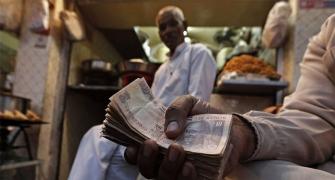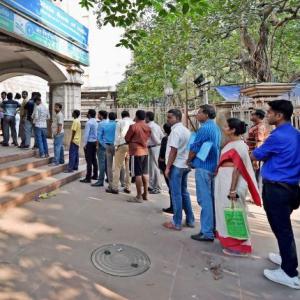With cash -- the primary medium of exchange -- all but disappearing, it is now unlikely that the expected fillip to demand on account of a good monsoon and proceeds from the Seventh Pay Commission payout will materialise.
Ishan Bakshi reports.
Illustration: Dominic Xavier/Rediff.com

The government's most ambitious policy that demonetised roughly 86% of the country's currency in circulation ended on Friday, but the hardship is likely to linger.
Across the country, bank branches are still unable to dispense the entire Rs 24,000 set as a per-week withdrawal limit. Many automated teller machines ATMs are still not dispensing cash.
State Bank of India Chairperson Arundhati Bhattacharya has also indicated that restriction on withdrawals cannot be lifted entirely unless more cash is made available to banks.
While it's too early to gauge its impact on the black economy and economic growth, opinion remains sharply divided. While some economists expect the hardship to last only two quarters, others predict sustained hardship.
Prior to November 8, the consensus among economists was that the third quarter would mark the beginning of a consumption-led recovery. But demonetisation has dealt a strong blow to those hopes.
With cash -- the primary medium of exchange -- all but disappearing, it is now unlikely that the expected fillip to demand on account of a good monsoon and proceeds from the Seventh Pay Commission payout will materialise.
With a revival in the investment cycle nowhere in sight, and export growth continuing to be sluggish, growth is now on an even weaker footing than before.
The worry now is that with aggregate demand collapsing, firms will cut back on production as inventories pile up.
Smaller ones will struggle. Some may resort to firing workers, depressing consumption further.
This will also delay fresh investments. A vicious cycle might ensue.
Given the unprecedented nature of the move, it is difficult to accurately gauge the impact of demonetisation on growth.
The Reserve Bank of India believes it will affect growth only to the extent of 15 basis points.
But with private forecasters paring their growth estimates by a greater magnitude, the RBI's projection has triggered a certain amount of scepticism.
A look at leading economic indicators would show growth is likely to slow down sharply.
Sales of two wheelers -- a leading indicator of rural demand -- contracted 5.2% in November, while those of light and medium and heavy commercial vehicles declined by 9.3% and 4.2% respectively.
Nomura's composite index is at its 1996 low which is consistent with 6% growth.
It would seem that the RBI is too worried about inflation, while being too complacent on the growth front.
But with many economists questioning the efficacy of monetary and fiscal policy to offset the disruption in economic activity caused by demonetisation, concerns that the effects may spill over to the next financial year seem valid.
With a demand shock of this magnitude, corporate top line growth will come under pressure. As Dhananjay Sinha, head, institutional equity, Emkay Global Financial Services, points out, the demonetisation shock is expected to nip the minor recovery seen recently, as it will have a significant impact on demand, corporate performance and the labour market.
Add to that rising input costs and corporate profitability will also come under pressure. According to a report from Kotak Institutional Equities, prices of 65% of the 40 basic raw materials it tracks are increasing.
In some cases, the increase is in double digits. This compression in margins will also impair firms' ability to service their interest obligations.
Brokerage houses have already slashed their earnings growth estimates.
The consensus earnings per share (EPS) estimates for Nifty companies have been cut by 3% for 2016-2017 since demonetisation according to data compiled by Bloomberg.
The carnage on the stock market provides a clear indication of the extent of pain.
After November 8, the BSE realty index has plummeted nearly 15%.
The consumer durables segment has fallen by 11%.
FMCG is down 7.2%, while auto has declined by nearly 8%.
The capital goods index is also down 5%, reflecting the scepticism over an investment revival.
Banks are also in a precarious position.
After demonetisation, while there has been a surge in bank deposits, credit off-take has plummeted.
With the gap between the two widening, bank profitability will take a hit.
Add to that the possibility of firm failures which will increase loan defaults and the NPA situation could take a turn for the worse.
Fearing a rise in loan defaults, the RBI has extended the repayment of loans by an additional 30 days. Earlier, it had postponed the payment window by 60 days.
It is certain, however, that banks will cut interest rates -- both deposit as well as lending rate -- because of the huge cash inflow after demonetisation.
Yet demonetisation continues to find popular support.
People do seem to be appreciating the move to cleanse black money from the system, discounting their temporary hardship.
Politically though it's difficult to know for sure how things play out.
While the move has ended up hurting the interests of the Bharatiya Janata Party-Rashtriya Swayamsevak Sangh's traditional support base of traders and small entrepreneurs, the prime minister continues to enjoy an enviable degree of popularity.
The upcoming Uttar Pradesh elections will offer an indication.










